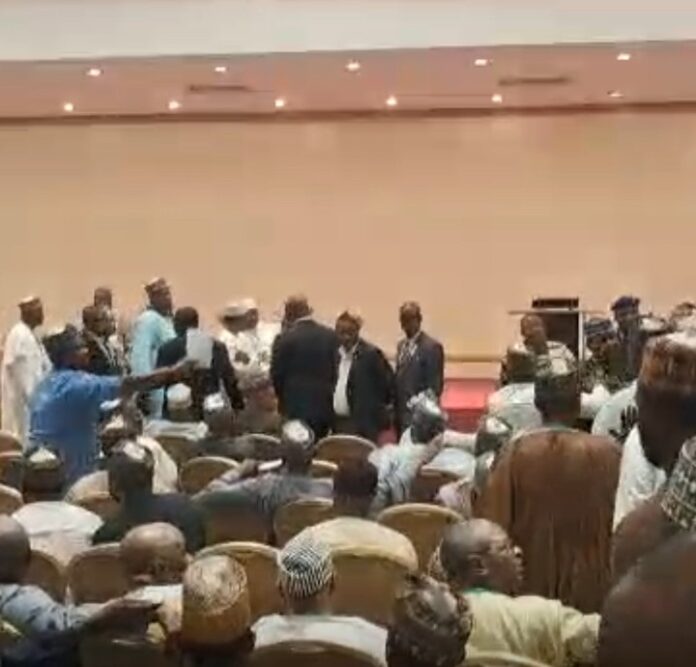A coalition meeting involving former Vice President Atiku Abubakar, Labour Party presidential candidate Peter Obi, former Rivers State Governor Rotimi Amaechi, and other political figures was thrown into confusion on Monday after delegates from Jigawa State disrupted proceedings over a dispute about their representation.
The meeting, organized by the National Political Consultative Group (North), took place at the Continental Hotel in Abuja. It was intended to build a strategic alliance between key political actors ahead of the 2027 general elections.
However, tensions quickly escalated when Babachir Lawal, former Secretary to the Government of the Federation, announced a delegate to speak on behalf of Jigawa State. Several delegates from Jigawa immediately protested, demanding that their preferred representatives be recognized instead.
In a bold move, the Jigawa delegates stormed the stage and blocked the individual nominated by Lawal from speaking. They insisted that they would only accept representation by delegates they chose themselves, sparking a chaotic scene.
Security personnel, including officers from the Nigerian Police, the Department of State Services (DSS), and private security, swiftly intervened to protect prominent figures like Atiku Abubakar and Rotimi Amaechi. They formed a protective ring around the leaders to prevent the conflict from escalating further.
After several tense minutes, calm was restored when Mustapha Lamido, son of former Jigawa State Governor Sule Lamido, and another delegate were selected to represent Jigawa State in the meeting. This resolution allowed the coalition talks to continue.
The incident highlights ongoing challenges within coalition-building efforts ahead of Nigeria’s next general elections. Disagreements over political representation, especially at the state level, remain a source of friction among party supporters and political stakeholders.
Jigawa State, in Nigeria’s northwest, plays a critical role in northern politics. The dispute over who speaks for the state underscores internal divisions and the high stakes involved in political alliances.
The National Political Consultative Group (North), which organized the meeting, aims to unite northern political leaders and strengthen their influence in the upcoming elections. The coalition, which includes major figures from the People’s Democratic Party (PDP), Labour Party, and other groups, hopes to present a united front.
Despite the disruption, organizers remain optimistic that the coalition talks will advance Nigeria’s political landscape by encouraging cooperation among diverse parties and leaders.
As Nigeria prepares for the 2027 polls, managing internal disagreements such as this will be key to forming strong political alliances that can challenge the ruling party.
The Abuja meeting marks an important moment in these efforts, even as it exposed unresolved tensions within the coalition’s ranks. How these will be handled could affect the success or failure of the alliance in the coming years.

